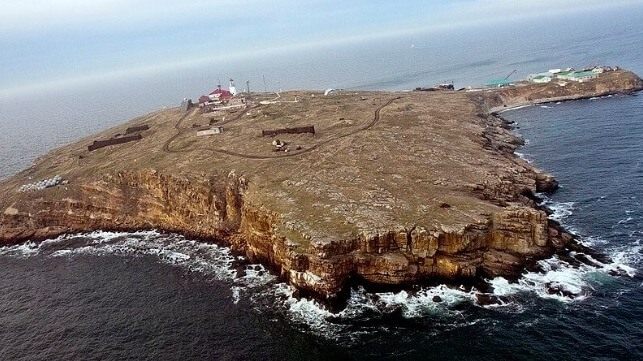Russian Navy Captures Ukraine's Outpost on Snake Island

In the opening day of its invasion of Ukraine, the Russian Navy captured Snake Island (Zmiinyi Island), a small border patrol outpost in the Black Sea about 70 nautical miles south of Odessa.
"After . . . shelling by the occupiers' naval weapons and combat aircraft, the infrastructure on the island was destroyed. According to available information, Zmiiny Island [Snake Island] has been captured," the State Border Guard Service said in a statement. "The enemy today repeatedly tried in vain to intimidate Ukrainian defenders on the island with demands to surrender. The border guards and [armed forces] bravely held the defense."
The Russian Navy warships Moskva and Vasily Bykov bombarded the island with deck guns before sending Russian soldiers ashore to take control of the facility, according to Ukrainian media. 13 Ukrainian border guards were reportedly killed in the action.
"On our Zmiinyi Island, defending it to the last, all the border guards died heroically. But did not give up. All of them will be posthumously awarded the title of Hero of Ukraine," said Ukrainian President Volodymyr Zelensky in an address on Thursday night.
The attack on Snake Island is a small part of the full-scale Russian invasion of Ukraine, from Chernobyl in the north to Donetsk in the east and Kherson in the south. The situation on the ground has moved rapidly since Russian forces launched a multipronged attack in the early hours of February 24. Intense fighting has been reported near Kherson and Kharkiv, and Russian forces have reportedly captured the site of the former Chernobyl nuclear plant.
So far, an expected amphibious assault on mainland Ukrainian territory has not materialized. Russian outlet Interfax initially reported amphibious units landing at the port cities of Odessa and Mariupol, but these reports have turned out to be false.
Before the beginning of the invasion, the Russian Navy mobilized six additional tank landing ships from the Northern Fleet and Baltic Fleet to bolster the existing amphibious capabilities of the Black Sea Fleet. The combined flotilla has the capability to land battalion-scale forces on unimproved shoreline; some analysts have predicted that this force is large enough to be used for tactical-scale operations, but that it is too small for taking a major strategic objective (like Odessa) on its own.
In the Mediterranean, a formidable force of Russian Navy warships - including two Slava-class guided missile cruisers, designed and built to target aircraft carriers - were deployed for exercises before the start of the invasion. Shortly after hostilities began, this force gathered together in tight formation and began sailing east, away from NATO forces and towards the Russian Navy's base at Tartus, Syria, according to analyst H.I. Sutton. The rationale for this movement was not immediately clear.

that matters most
Get the latest maritime news delivered to your inbox daily.
On Thursday, the government of Ukraine officially asked the Turkish government to close the Bosporus and the Dardanelles to Russian naval vessels. A spokesperson for Turkey's ruling political party, Justice and Development, told Al Monitor that it is assessing the request and “will use its discretion in favor of peace instead of deepening the conflict.”
Top image: Snake Island, 2008 (Fotonak / CC BY SA 4.0)
